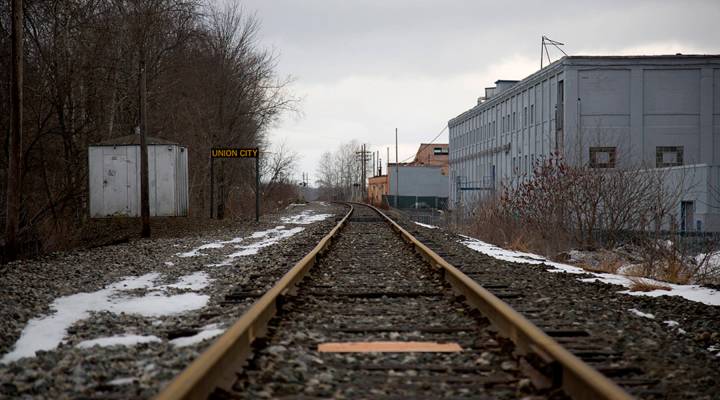
Union City: a town waiting on Trump’s promises
Union City: a town waiting on Trump’s promises

On Tuesday, we introduced you to Erie County, Pennsylvania, where constituents in November voted for a Republican presidential candidate for the first time since 1984.
It’s the start of “The Big Promise,” our yearlong reporting project based in Erie. What happens in a place where the economy’s changing, manufacturing jobs have left and those voters are counting on the promises the president-elect made during the campaign?
Today, we’re visiting Union City, Pennsylvania — population 3,300, located in the rural outskirts of Erie County.
In small towns like Union City, there’s always a place where the locals gather. Here, it’s Ma-Donna’s restaurant, where the motto is “Enter a stranger, leave a friend.”
Tonette Diffenbacher, co-owner of Ma-Donna’s with her sister, has lived in Erie County her whole life — like many of the people we’ve met in Erie County.

Tonette Diffenbacher
When asked how she’s feeling about things, she replied, “I’m hoping that they’re going to think about the little people, taxwise, economy. Get some jobs in here. Stuff like that. I’m not real sure how that’s going to happen. There’s just so many things in this town that are now gone. There used to be several big businesses in town.”
Union City once called itself “the chair capital of the world.” Manufacturers like Ethan Allen made furniture here, and boats and tools, but most of those companies have left, taking hundreds of jobs in the city with them.
Every morning at 8 o’clock, a group sits down at what Diffenbacher affectionately called the “Troyer table.”

Members of the Troyer table at Ma-donna’s Restaurant.
The group consists of dairy farmer Merv Troyer; his brother and local realtor, Norm Troyer; William Mitchell, who works in the oil and gas industry; taxidermist Blaine Blakeslee; and fourth-generation funeral director Bob Glenn. They sit around the table and have the same conversations that are happening across the country.
“The election was a revolt. Absolute revolt,” Norm Troyer said.
But Bob Glenn has doubts about Trump.
“He can show his golden palace where he lives and talk about how rich he is and all this and that, but he’s never made an effort to pay back the companies that he left bankrupt,” Glenn said. “That’s where I have my reservations, specifically because he’s come out and said, ‘We’re going to keep jobs in this country.'”
Norm points to the economic disconnect that made Trump popular in places like Union City.
“The coastal areas, they have their cozy little deals going on, but you don’t make $30 an hour in our town,” he said. “More like $10, $15, if you’re lucky to have a job…. He represents more of us, the common, ordinary person. We have to hitch our wagon to that hope that this revolution can bring something to us … all of us.”
Down on the other end of Main Street, there was a sign welcoming visitors to town, a sign that Union City native Brian Maynard said sums up what happened to Union City:

Left: Union City’s former “Welcome Chair.” Right: An abandoned chair factory in Union City.
“Down by the diner, right across the street from the diner, there used to be a chair. It was the welcome chair for Union City because we were the chair capital of the world,” he said. “As things started to go downhill a little bit, then we replaced that with this boat because we also made boats there. Then after they quit making boats there, then we put a little plaque there with a list of all the businesses in Union City. When the businesses started going under, now we’ve just got a thing that says, ‘Welcome Union City.'”
Maynard used to work in some of the factories that made those chairs. Now, he works the overnight shift in a potato chip factory for $10 an hour. On the side, he runs the Union City Historical Society Museum and DJs at the radio station — classic rock, mostly.
Maynard’s nearing 60, and while retirement should be on the horizon, “I’ll probably have to hit the lottery to do that,” he said.
He’s a Trump voter, “fiercely proud of it,” because he believes Trump will bring jobs back to Union City. That decision, it turns out, puts him at odds with some of his family.

Union City residents Brian Maynard and father Harold Maynard.
Brian’s dad, Harold, 85, is one of them.
“I’m a Republican, but I voted for Clinton because I looked at the people that were supporting Trump,” Harold said. “The language that they use — the gutter language they use on the streets today, or in public or wherever, was exactly what Donald Trump was feeding with the people.”
Asked about Brian’s work situation, he replied, “Making 10 bucks an hour is a little better than he had, isn’t it?”
“Yeah, it’s better than nothing,” Brian said.
Better than nothing, but Brian Maynard wants more for himself and his hometown. He wants what he was promised by Trump: a return back to the way they used to be.
Tomorrow, our series “The Big Promise” airs live from Erie, Pennsylvania, at the Brewerie. If you’re in town, come on by.
This story was produced as part of our election series, How the Deck is Stacked, in collaboration with Frontline and PBS NewsHour. You can find more stories related to this series here.
There’s a lot happening in the world. Through it all, Marketplace is here for you.
You rely on Marketplace to break down the world’s events and tell you how it affects you in a fact-based, approachable way. We rely on your financial support to keep making that possible.
Your donation today powers the independent journalism that you rely on. For just $5/month, you can help sustain Marketplace so we can keep reporting on the things that matter to you.












